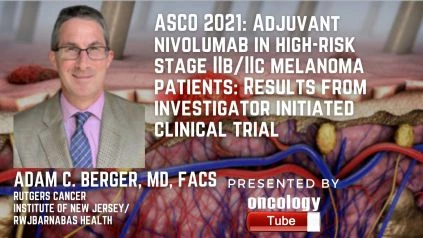Adam C. Berger, MD, FACS, Chief, Melanoma and Soft Tissue Surgical Oncology, Associate Director for Shared Resources at Rutgers Cancer Institute of New Jersey/RWJBarnabas Health discusses the ASCO 2021 Abstract – Adjuvant nivolumab in high-risk stage IIb/IIc melanoma patients: Results from investigator initiated clinical trial.
Link to Abstract:
https://meetings.asco.org/abstracts-presentations/197065
Background information:
Recurrence rates for Stage IIB and IIC melanoma have been shown to be as high as 46% in 5-year trials. The only FDA-approved medication for these high-risk individuals to avoid this inevitable recurrence is high-dose interferon-alfa, which is highly toxic. There are currently adjuvant immunotherapies (anti-PD1) and targeted treatments (anti-BRAF and anti-MEK combinations) licensed for Stage III patients, some of whom will have a lower baseline recurrence risk than those with Stage IIB/IIC melanoma. We wanted to see if adjuvant PD1 inhibition with nivolumab (N) improved recurrence free survival (RFS) rates when compared to historical RFS rates.
Methodologies:
Our phase 2 clinical research (NCT03405155) is a single-arm, open label, multi-center research assessing RFS at 24 months in patients with Stage IIB/IIC melanoma treated with N at 480 mg IV every 4 weeks for 12 cycles. A secondary objective is overall survival. Circulating tumor cell DNA and immunological correlates are two examples of related translational research.
The following are the outcomes:
The trial involved 23 patients with Stage IIB melanoma and three individuals with Stage IIC melanoma, all of whom received at least one dosage of N. At the time of data cutoff, 22 patients were still being followed up on, as four patients withdrew consent at various points throughout the study – one after one dose who wanted to stop, one due to COVID concerns and the need for repeat visits, one due to insurance issues, and one due to recurrence and wanting to stop (which was captured in study data and RFS calculations). Nine patients have completed therapy but have fewer than two years of follow-up; the median follow-up is presently 21.9 months. Seventeen patients have been on the clinical study for at least two years, with nine patients having completed therapy but with less than two years of follow-up. Two patients developed melanoma recurrence, one after receiving cycle six of N and the other a year after finishing treatment, resulting in an RFS of 87.8% (90 percent CI (64.2 percent -96.3 percent) at two years, compared to a historical RFS of 70% at two years. There were no N-related serious adverse events (SAEs), with only 2% of Grade 3 AEs (various and unrelated to treatment) and the rest being Grade 1-2, including 21% GI, 18% cutaneous, and 10% musculoskeletal, respiratory, and fatigue, respectively; overall, only 2% of these Grade 1-2 AEs were treatment related.
Final Thoughts:
Our early findings demonstrate that nivolumab treatment improves RFS in patients with Stage IIB/IIC melanoma. Patients are still being followed since the cohort has not met a minimum follow-up of at least two years for RFS. We saw the predicted adverse effects during the research, but no additional toxicities were discovered. In stage IIB/IIC melanoma patients, data maturation will disclose the entire effect of adjuvant N on disease recurrence, overall survival, and distant metastasis-free survival. NCT03405155 is the number for the clinical trial.

